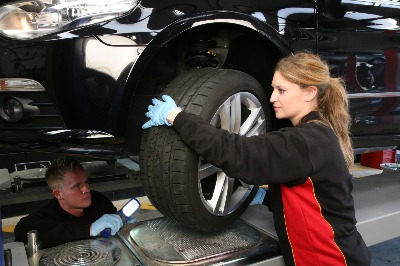How To Stop Tyre Vibrations
When you’re driving, having a smooth and comfortable ride is important. However, sometimes you may feel a vibration in your car, which can be uncomfortable and dangerous. One of the possible causes for a vehicle vibrating is its tyres.
In this blog, we’ll explore how a tyre can cause a car to vibrate, and all the possible solutions.

What causes tyre vibrations?
Tyre vibrations can develop over time, especially if you drive long distances frequently. A tyre vibration is when you can feel or hear the car vibrating whilst driving. This could be down to a road surface, so make sure you test the tyres on multiple roads before determining if it is indeed the tyre causing your vehicle to vibrate.
There are several reasons why your tyre may be causing a vibration. The most common ones are:
Tyre Wear
As tyres wear down over time, they may become uneven and develop flat sports. These irregularities can cause vibrations when they come into contact with the road. Whilst causing vibrations, uneven tyre wear may also lead to your car pulling in a different direction.
Uneven tyre wear may be down to your driving style, which could lead to certain areas of the tyre wearing faster than others.
Tyre Pressure
If your tyres are underinflated or overinflated, this can also cause tyre vibrations. Overinflated tyres can make your car bouncier on the road, which can also lead to uneven wear across the tyre surface. Underinflated tyres can cause a wobbling sensation within the tyre, due to the tyre flexing and moving upon contact with the road.
Tyre Damage
Over time, your tyre may develop cracks or bulges. This can be down to the tyres being at the incorrect pressure, the vehicle not being used for a prolonged period of time, or hitting a defect in the road surface such as a pothole.
Suspension Issues
A damaged or worn suspension on your vehicle can also cause vibrations when driving. The suspension system is responsible for absorbing shocks and vibrations, so if it is worn or damaged it may not be functioning correctly.
This can lead to the shocks and vibrations being felt within the body of the vehicle, instead of being absorbed during contact.
How to diagnose tyre vibration
If you’re experiencing tyre vibrations and are still unsure what is causing it, here are a few quick checks you can perform.
Check tyre pressure
You can check your tyre pressure by using a tyre pressure gauge or any pump which has an air pressure gauge built in. To avoid any uneven wear or vibrations, you should ensure that your tyres are inflated to the exact PSI level recommended by the manufacturer. To find the correct tyre pressure for your vehicle, click the link below.
Tyre Pressure
Inspect your tyres
Another way to quickly check your tyres is by visually inspecting them for damage. You should look for and cracks or bulges around the tyre sidewall, along with any objects puncturing the tyre. At National, we offer a FREE tyre check. To book, click the link below.
Free Tyre Check
Check suspension system
If you have checked your tyres and discovered that your tyres aren’t causing vibrations through your vehicle, it may be a fault with your suspension system. At National, our technicians can check your suspension for FREE, and recommend any repairs that may resolve your vibrations, to book a FREE check, click the link below.
Suspension Check
How to fix tyre vibrations
Once you have found the cause of your vibrations, there are a few solutions, depending on the problem.
Tyre Balancing
Tyre balancing ensures that both wheels on the axle are balanced, allowing for a smoother ride and preventing the car from vibrating or pulling to one side. This is done by adding a small weight to the inside of the wheel rim, ensuring that weight is evenly distributed across the axle.
To find out more about wheel balancing, and to book a balancing appointment, click the button below.
Tyre Balancing
Tyre alignment
Wheel alignment, also known as tracking, is the process of setting your vehicle's tyres to the optimum position, in line with manufacturer specifications. This can prevent vibrations, as it will stop the car from pulling to one side and causing uneven tyre wear, which will also help your tyres last longer. For more information and to book a tyre alignment, click the link below.
Wheel Alignment
Tyre replacement
If you have found a fault in your tyre, such as a crack, then you will need to have your tyre replaced immediately. We stock a wide range of brands and sizes at National, allowing you to get the perfect tyre for your vehicle. To find and order a tyre, click the link below.
Order Tyres
Suspension repair
If you have fund suspension damage to be the cause of your vibrations, you should have it repaired or replaced as soon as possible. A broken suspension could lead to your car becoming undrivable if not repaired, which could be a more expensive job than having it repaired when the vibrations first start.
To book your vehicle in for a suspension repair or replacement, click the link below.
Suspension
Tyre vibrations can be a common occurrence in driving, especially for those doing thousands of miles. Diagnosing the problem and completing any repairs is crucial for driver safety, to prevent a potential puncture or blowout.
It can also save you money down the line, as having your tyres in perfect working condition will prevent any uneven wear or cracks, meaning your tyres will last longer.
Did you enjoy this blog post? |2 people found this review helpful



 Sign up for SPECIAL OFFERS
Sign up for SPECIAL OFFERS
